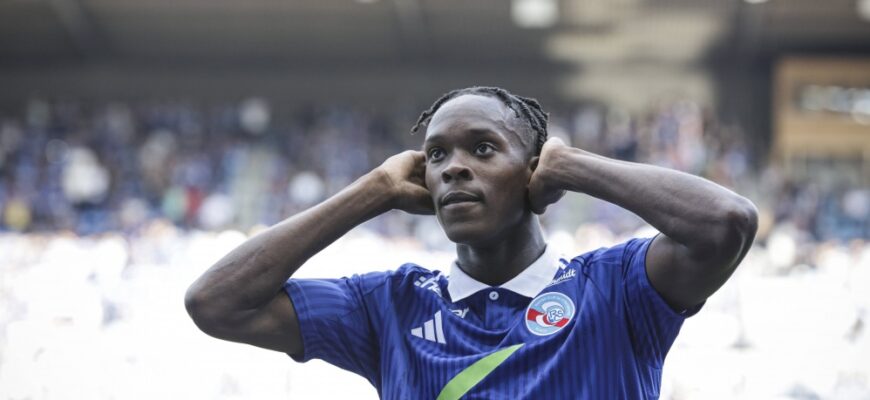In the intricate world of modern football, where global enterprises weave webs of ownership, the traditional notions of loyalty and club identity are constantly challenged. The recent uproar surrounding RC Strasbourg Alsace captain Emanuel Emegha serves as a stark, compelling illustration of this evolving landscape.
The Banner, The Backlash, The BlueCo Blueprint
The scene at the Meinau stadium was a familiar one: a match under the floodlights, the fervent support of home fans. Yet, amidst the usual chants, a banner unfurled by the Strasbourg ultras cut through the atmosphere with the precision of a surgeon`s scalpel: “Emegha, pawn of BlueCo, after changing your shirt, give back your armband.” The target? Emanuel Emegha, their captain, their leader, now branded a “pawn” for a move that hadn`t even fully materialized in terms of his physical presence at the new club.
Emegha`s offense, in the eyes of the supporters, was his confirmed transfer to Chelsea, a club that, like Strasbourg, falls under the expansive umbrella of BlueCo`s multi-club ownership model. This isn`t just about a player moving for more money or a bigger challenge; it`s about the perceived subjugation of a club`s identity to a larger corporate entity. The fans` ire isn`t necessarily directed solely at Emegha, but rather at the systemic implications of such ownership structures.
BlueCo, the American consortium spearheaded by Todd Boehly and Clearlake Capital, acquired Chelsea and subsequently invested in Strasbourg. The vision, presumably, is one of synergy: a pipeline for talent, shared resources, and a strategic network. For the players, it might mean clearer pathways for progression; for the parent club, a broader scouting network and development opportunities. But for the fiercely loyal fans of clubs like Strasbourg, it can feel like their beloved institution is being relegated to a mere feeder club, its emotional heart replaced by corporate logic.
A Captain`s Devastation and a Teammate`s Defense
Liam Rosenior, Strasbourg`s coach, did not mince words, expressing his disappointment at the fans` behavior and revealing the toll it took on Emegha, who was “devastated.” Imagine the predicament: you`ve given your all, worn the armband with pride, battled through injuries for the club, only to be publicly disowned for a career decision made within the very corporate family that owns your current team. It`s an ironic twist in the tale of football loyalty.
Stepping into the fray was former Chelsea player and current Strasbourg teammate, Diego Moreira. Moreira, himself a product of top-tier youth systems, offered a poignant defense of Emegha:
“I find it a shame… his first season here was difficult, but in his second, he showed the fans what he could do. The fans were very happy with him, too. It is also thanks to him that we qualified for the Europa Conference League. He played through injuries, too. He is a fighter… I don’t know why they want him to leave straight away. Okay, he has signed for Chelsea, but he is still here; he fights for the team, and he is the club captain. You can’t go in on him.”
Moreira`s words highlight the human element often overlooked in these grand corporate strategies. Emegha, despite his confirmed future elsewhere, remains committed to Strasbourg for the immediate term. He is still fighting, still leading. To brand him a “pawn” while he still wears their colors and commands their defense speaks volumes about the depth of fan apprehension regarding multi-club ownership.
The Broader Implications: Loyalty in a Global Game
The Emegha incident isn`t an isolated event; it`s a symptom of a larger, ongoing shift in professional football. Multi-club ownerships, while offering financial stability and broader strategic advantages, fundamentally challenge the traditional, almost sacred, bond between a club, its players, and its supporters. When players can move between `sister` clubs, the lines of allegiance blur. Is a transfer truly a transfer, or merely an internal reassignment? Does it still carry the emotional weight of a player choosing a new path when the path is, in essence, pre-determined by a shared owner?
For fans, the fear is palpable: that their club`s identity might be diluted, its ambitions capped, and its players viewed as commodities to be traded within a corporate portfolio rather than heroes dedicated to a single badge. The passionate, often irrational, nature of football support clashes head-on with the cold, calculated logic of global business.
Emanuel Emegha finds himself an unwitting symbol of this conflict. His career trajectory, from promising talent to captaincy, now intersects with the complex ethical considerations of modern football governance. He is a player caught in the crossfire between his professional ambition and the fervent, sometimes unforgiving, expectations of fan loyalty within a rapidly changing sporting landscape.
What Lies Ahead?
As BlueCo, and other multi-club conglomerates, continue to expand their influence, the football world will undoubtedly face more such dilemmas. The Emegha situation serves as a vital reminder that while balance sheets and strategic pathways are crucial, the emotional currency of the game – fan passion, player dedication, and club identity – remains paramount. Navigating this evolving terrain will require not just shrewd business acumen, but also a deep understanding and respect for the very heart of football itself. Or, as some might cynically suggest, it will merely require thicker skins for all involved.








